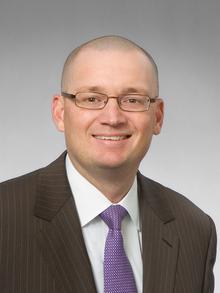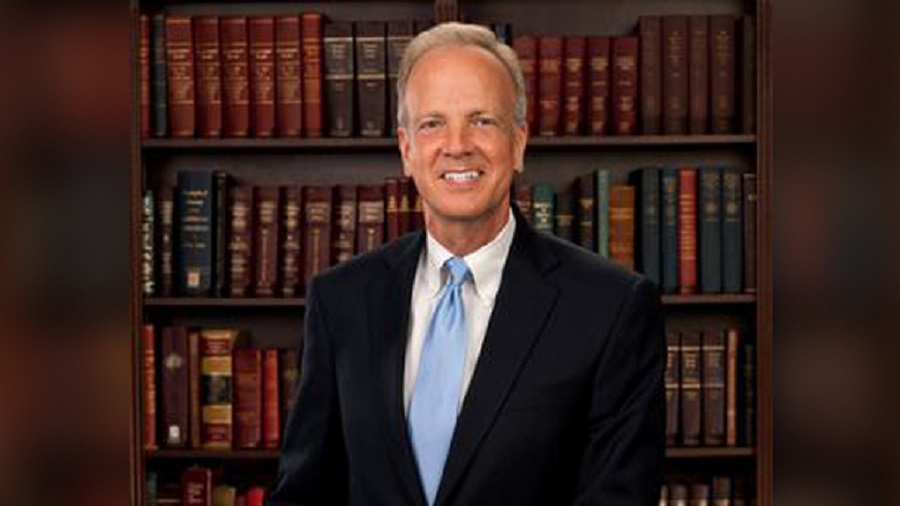The nation’s eyes have been riveted on the U.S. Senate’s efforts to confirm Amy Coney Barrett to the Supreme Court before the election.
But there’s another judicial nomination — one with a distinct Kansas connection — that is engendering its share of controversy, although not on the same scale as Barrett.
Solicitor General Toby Crouse — the state’s top appellate lawyer for Attorney General Derek Schmidt — is running into opposition from liberal groups as he seeks a seat on the district court bench.
He’s been criticized for work defending Kris Kobach’s proof-of-citizenship law and former Gov. Sam Brownback’s decision to cut Planned Parenthood off from Medicaid funding.
The opposition, however, is not limited to those issues. It reaches into immigration, gun rights and LGBTQ equality. Even questions that Crouse’s nomination isn’t a diverse enough choice have been raised by groups on the political left.
“Toby Crouse has been on the front lines in Kansas in trying to turn back the clock on scores of rights and legal protections,” said Daniel Goldberg, legal director for Alliance for Justice, a progressive judicial advocacy group.

“We have no doubt that if he is confirmed to a lifetime seat on the federal bench, he will continue to advance his dangerous agenda,” Goldberg said.
Debate has already been closed on Crouse’s nomination, and a confirmation vote is expected at some point when the Senate returns from a recess caused by the coronavirus. It’s not clear when a vote will occur.
He would be President Donald Trump’s third appointment to the federal district court bench in Kansas. Trump has already appointed District Judges John Broomes and Holly Teeter to the bench.
The Senate Judiciary Committee voted along party lines to send Crouse’s nomination to the full Senate with U.S. Sen. Dianne Feinstein registering the most strenuous objection. She called his nomination “troubling.”
U.S. Sen Mazie Hirono, a Hawaii Democrat, expressed concern during Crouse’s hearing that he would bring a conservative bias to his work as a judge.
“Your public statements, the amicus briefs that you joined as solicitor general of Kansas and many other aspects of your career show that you have an anti-choice, anti-LGBTQ rights, anti-immigrant, anti-voting rights, pro-Second Amendment agenda,” Hirono said.
Crouse, who declined to comment for this story, told the committee he would be a neutral arbiter of the law.
“I believe that judicial nominees should be apolitical, and that’s what I intend to do,” Crouse said in response to Hirono’s remarks.
“I commit to the committee that I will not base any decision that I make on my personal views but rather on the law and precedent,” he said.
Crouse, who was deemed as well qualified by the American Bar Association, has support from both U.S. Sens. Pat Roberts and Jerry Moran and Attorney General Derek Schmidt.
“Toby Crouse is a steady, humble and talented lawyer with great experience and an impressive record,” Roberts said in a statement.
“I have continuously supported Toby throughout his confirmation process, and I have no doubt he will serve Kansans and our state honorably,” he said.
Moran said Crouse is “well-qualified” for the judgeship and is “dedicated to fairly upholding the law.”

“Toby Crouse demonstrated his judicial views and qualifications in front of the Judiciary Committee and was favorably reported out of the committee,” Moran said in a statement.
“Through his experience in private practice, as a clerk for Tenth Circuit Judge Mary Briscoe and as the state of Kansas solicitor general, he has experience in all phases of litigation and has litigated three United States Supreme Court cases.”
Crouse worked at Shook, Hardy & Bacon from 2003 to 2007 before joining the Foulston Siefkin law firm in 2008 and stayed until 2018, according to his questionnaire for the Senate Judiciary Committee.
He is a graduate of Kansas State University in 1997 and earned his law degree from the University of Kansas in 2000.
At the state level, Crouse argued the school funding case on behalf of the Kansas Legislature.
Last year, the state Supreme Court ruled that the state complied with an order requiring the Legislature to add more money to schools.
But Crouse is drawing more attention for federal cases, most notably criticized for defending the law Kobach crafted as secretary of state requiring proof of citizenship for registering to vote.
Crouse became solicitor general in 2018, years after the law was enacted, but took the case on appeal after Kobach personally tried the case and lost in district court.
At one point, Feinstein directly asked Crouse about whether there was evidence of widespread voter fraud to justify the citizenship law.
“I was called as the advocate on behalf of the state to defend that law in federal court, and I have done so,” Crouse said told the senator.
“The law was passed by the Legislature. It was their policy choice to do so, and the evidence that I had on the appeal was that which was identified in district court.”
Crouse also has been criticized for defending a decision by Brownback’s administration to cut Planned Parenthood off from Medicaid funding, litigation the state ultimately lost when the U.S. Supreme Court refused to hear the case.
“As Kansas solicitor general, Toby Crouse has gone out of his way to attack reproductive freedom,” said Kristin Ford, spokeswoman for the abortion rights group NARAL Pro-Choice America.
But his critics go much deeper with their criticism, citing many friend-of-the-court briefs that Kansas joined with other states in filing with the U.S. Supreme Court.
The cases cover a range of issues, including gun rights, LGBTQ rights and immigration.
The state has authored or joined about 70 amicus briefs filed with the Supreme Court since Crouse has been solicitor general, although his name is not on many of them.
The decision on whether to join an amicus brief is made by Attorney General Derek Schmidt, a spokesman said
“The attorney general seeks input from his legal staff — including the solicitor general — on whether to join an amicus brief,” spokesman John Milburn said.
“However, the ultimate decision is made solely by the attorney general.”
However, Goldberg said Crouse needs to be held accountable for the amicus briefs filed when he was solicitor general.
“The reality is he is the solicitor general of the state,” Goldberg said.
“This is not an individual who threw up his shingle above a drug store and is taking any client that walks through the door. He has taken a political position as one of the top legal officials in the state of Kansas.”
Crouse’s critics cite one amicus brief from 17 states, including Kansas, that asked the U.S. Supreme Court to review a lower court ruling that found a florist discriminated against a same-sex couple by refusing to provide floral services.
The brief in the florist case, which does not include Crouse’s name, was authored by Texas Attorney General Ken Paxton. The court has not yet reached a decision in that constitutional dispute.
Critics also cite another brief that Kansas joined defending President Donald Trump’s efforts place to a citizenship question on the U.S. census.
The census brief, which also does not include Crouse’s name, was authored by the attorneys general in Arkansas and Oklahoma. The Supreme Court blocked the Trump administration from using the question.
U.S. Sen. Richard Blumenthal, a Connecticut Democrat, asked Crouse during his confirmation hearing about why he didn’t sign onto various amicus briefs that Kansas joined with other states.
“Is there a reason you didn’t sign those briefs even though you served, as you have stated, as the state’s chief appellate lawyer?” Blumenthal asked.
Crouse said his role as solicitor general is to file pleadings on behalf of the state.
“I think it’s important to remember that those are amicus briefs submitted on behalf of separate states,” he said.
“States frequently have sovereign interests that are either aligned with the litigants or they are not,” he said.
“The reason why I didn’t sign those briefs was because they were authored by a different state.”
Blumenthal pressed Crouse about whether he agreed with views in those briefs.
“The state of Kansas decided to join those,” he said. “I think the typical practice is for the state attorney general to submit those.”
But there are other cases where Crouse was more intimately involved.
Crouse was part of a team from the attorney general’s office that filed a brief arguing that Second Amendment gun rights go beyond the firearm to include accessories such as silencers.
The brief, joined by seven other attorneys general, asked the Supreme Court to reverse a federal appeals court, which held that firearms accessories fell outside the scope of the Second Amendment. The court refused to hear the case.
The brief argued that a lower-court ruling that found that firearms accessories are not protected by the Second Amendment threatened the right of Kansans “to keep and bear arms for the defense of self, family, home and state, for lawful hunting and recreational use, and for any other lawful purpose.”
The Giffords Law Center to Prevent Gun Violence is among the groups that called for the Senate to reject Crouse’s nomination.
“During his short tenure as Solicitor General, Toby Crouse made sure the gun lobby knew he was ready, willing and eager to carry their water,” Giffords center chief counsel and policy director Adam Skaggs said after Crouse’s confirmation hearing last July.
“Crouse went out of his way to oppose gun safety laws in Kansas and other states and took positions that, if accepted, would make it nearly impossible to regulate dangerous weaponry such as silencers and bump stocks,” Skaggs said.
Crouse’s opponents also criticized him for defending as constitutional a police traffic stop in Douglas County for a revoked driver’s license based on a vehicle’s registration.
The U.S. Supreme Court sided with Crouse, reversing a state Supreme Court decision that found it was unreasonable under the Fourth Amendment for a sheriff’s deputy to suspect the registered owner of a vehicle is the same person behind the wheel.
The justices found in an 8-1 ruling that it was reasonable for the deputy to infer the driver of the pickup had been driving with a revoked license.
It was one of two cases that Crouse successfully argued before the U.S. Supreme Court within in about a month.
Crouse also successfully defended Kansas insanity defense law, a statute that was challenged by James Kahler who shot to death four family members on Thanksgiving weekend 2009.
Schmidt declined comment for this story, but he has encouraged the Senate to quickly move Crouse’s nomination along.
“Toby is well-qualified for this position,” Schmidt said, “and will serve capably with fidelity to the law as it is written and with proper respect for the role of states and of individual liberties in our federal system.”
















